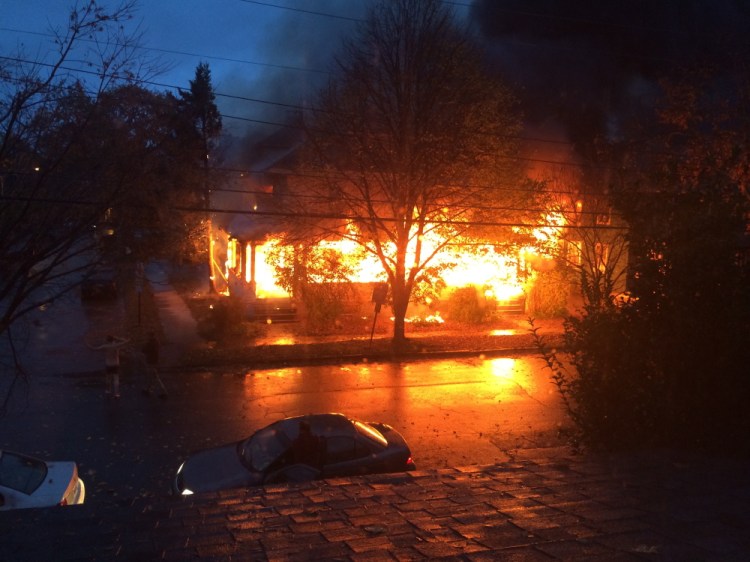A Portland landlord who pleaded not guilty to manslaughter charges stemming from the most deadly fire in Maine in 40 years has waived his right to a jury trial.
Gregory Nisbet was indicted on six counts of manslaughter in the wake of the Nov. 1, 2014, fire that killed six people. Nisbet has been accused in lawsuits filed by victims’ families of offering individual rooms for rent at the duplex at 20-24 Noyes St. without making the life-safety upgrades that are required to protect tenants in a rooming house.
Nisbet’s lawyer, Matthew Nichols, said a judge granted the request for a bench trial on Aug. 31. The trial, which Nichols estimated would take five to seven days, is set to begin Oct. 3 before Cumberland County Superior Court Justice Thomas Warren.
A person is guilty of manslaughter if he recklessly or with criminal negligence causes the death of another person. It is a Class A crime punishable by up to 30 years in prison and a $50,000 fine. If Nisbet is convicted, it would be the first time in Maine that a landlord was successfully prosecuted for manslaughter in the death of a tenant because of negligent operation of the building.
Nichols said Nisbet requested the bench trial, which means the case will be heard by a judge, because of the complexity and because much of the case will revolve around arguments about the legal definition of whether 20-24 Noyes St. was a rooming house or a duplex, which have different fire safety requirements. After those issues are settled, the case will move on to address the manslaughter charge.
“From our perspective, those issues are better presented to a single fact-finder who is much more used to dealing with complex issues than 12 jurors,” Nichols said. “It’s not uncommon for a case like this.”
TRAGIC ACCIDENT OR MANSLAUGHTER?
Maine Deputy Attorney General Lisa Marchese said the state agreed.
“It is a complicated case,” Marchese said. “This case involves several rules and regulations that do not include everyday parlance. And we certainly agree with the defense that it is a complicated case and it makes sense to have a jury-waived trial.”
Not having a jury will not change the prosecution’s strategy, she said, but “practically speaking, it might shorten the case a little bit.”
Nichols described the fire as “an accident, a tragic accident,” and said Nisbet is being charged with manslaughter even though he did not set the fire or dismantle fire safety equipment, and even though any code violations were “physically created by the tenants.”
“This case is unique,” Nichols said.
The cause of the Noyes Street fire was found to be accidental – a discarded cigarette ignited a fire on the front porch. However, fire investigators concluded that the house did not have functioning smoke detectors, let alone the more sophisticated fire alarm system that would be required of a rooming house.
Marchese has said the state believes “Nisbet failed to be aware or consciously disregarded all of the problems with the apartment building,” and noted that other states, including New York and Rhode Island, have successfully prosecuted similar cases.
Fire officials said the fire started on the porch and quickly engulfed the front door. A rear staircase was blocked, forcing the three survivors to jump from second-story windows.
The fire killed Steven Summers, 29, of Rockland, Maelisha Jackson, 23, of Topsham, and Christopher Conlee, 25, of Portland, who were visiting the house, and David Bragdon Jr., 27, Ashley Thomas, 29, and Nicole Finlay, 26, who were residents.
In the wake of the fire, the city toughened its inspection requirements for apartments in Portland and created an office specifically to oversee rental units. Every Portland landlord also is now required to register with the city and pay a $35-per-unit fee, or face a fine of $100 per day.
Previously, city firefighters had only been conducting proactive inspections of businesses and apartment buildings containing three or more units. However, nearly half of the city’s rental units are two-family homes like the one at 20-24 Noyes St.
BENCH TRIALS IN COMPLEX CASES
A longtime criminal defense attorney and law professor said it is not uncommon for complicated cases to go to a bench trial.
E. James Burke said he could not comment on the Noyes Street fire case in particular, but in general, bench trials are a good option for defense attorneys with cases that are complicated, whether in technical detail or because they are politically or emotionally charged situations.
“It is often done because the sense is that the case is such that the judge will be better able to follow what is being presented than a jury might,” said Burke, who practiced criminal law for 30 years in Lewiston and has been a clinical professor at the University of Maine School of Law for the past 14 years.
“When we as defense lawyers have a case occasionally where it is so politically sensitive that it is felt you can’t find a fair jury amongst the citizenry, we’ll often waive a jury trial,” he said. Judges are trained to be dispassionate and logically address the legal issues, Burke said. “That’s sometimes hard for lay people to do,” he said.
A conviction would not necessarily require Nisbet to go to prison, but the state will push for that, officials said.
A Cumberland County grand jury indicted him July 10 after plea negotiations between Nichols and the office of Cumberland County District Attorney Stephanie Anderson collapsed when Nisbet refused to agree to a manslaughter plea. Anderson’s office had given Nisbet a chance to plead to fewer counts of manslaughter and would have recommended a lesser punishment than what he could face if convicted in court.
Send questions/comments to the editors.






Comments are no longer available on this story